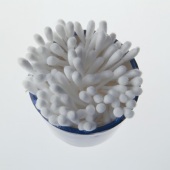
WEDNESDAY, May 4 (HealthDay News) — A new study has found a direct association between using cotton swabs to clean the ears and ruptured eardrums.
The good news is that almost all of the cases of ruptured eardrums healed without surgery, the researchers pointed out.
“In the past, many otolaryngologists have wondered if surgery is really necessary to treat a ruptured eardrum. The results of this study show that 97 percent of cases healed on their own within two months, proving that most cases do not require surgery,” Dr. Ilaaf Darrat, an otolaryngologist (ear, nose and throat specialist) at Henry Ford Hospital and co-author of the study, said in a hospital news release.
That’s no reason to get complacent about how you clean your ears, however.
More than half of the people who visit ear, throat and nose specialists confess to using swabs — tiny sticks with cotton on the ends — to clean their ears, but the practice can damage the ear if people push them in too far.
A ruptured eardrum is just one unpleasant potential outcome, because that can lead to tinnitus, and in severe cases, to vertigo and facial paralysis.
“If a patient is experiencing symptoms such as hearing loss, drainage, dizziness or abnormality in their facial movements, they should see a doctor immediately to assess the possible ear damage,” Darrat said in the news release.
In the study, the researchers examined the medical records of 1,540 patients who suffered from ruptured eardrums between 2001 and 2010. They found that although most cases healed on their own, some complications — like facial nerve paralysis — required surgery.
As for alternative ways to clean your ears, study co-author Dr. Michael Seidman, director of the division of otologic and neurotologic surgery at Henry Ford Hospital, recommends these methods:
- Mix equal amounts of cool peroxide and hot tap water. Allow the mixture to reach body temperature and then irrigate the ear — gently — no more than twice a month.
- Another idea is to mix one part plain vinegar and one part water and use four or five drops once a week.
- Make an appointment with a doctor to have ear wax removed, or try an over-the-counter treatment to soften the ear wax so it can be flushed out.
The study findings were presented April 29 at the Combined Otolaryngological Spring Meeting in Chicago. Because the study has not yet been published in a peer-reviewed journal, the findings should be considered preliminary.
More information
For more on ear wax blockage, visit the U.S. National Library of Medicine.

